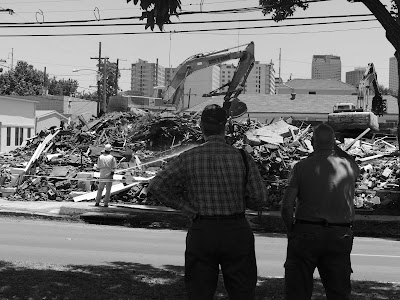Tuesday, May 17, 2011
Death of Deutsches Haus
All too often, I hear an argument here in New Orleans. It's a variation on the adage that is often dragged out in the wake of a fire or tornado: "It's not the church building that matters, it's the people that make up the church that are important."
While I understand that sentiment, I think it's had its day in New Orleans given the demolition binge that is still underway. In this city, it's not just about the people alone, just like it's not about the intangibles in the music or the food alone. It's about the distinctive physical place too, the physical geography and the built environment. They provide the peculiar stage that help to make the city's unique people what they are. As one prominent local musician told me over Mardi Gras, it's the real pre-requisite for the "culture" that is so-often heralded and praised here as an invaluable asset.
For example, with shotgun houses, as with passenger pigeons, we may not recognize the ongoing losses until its too late - until New Orleans is no longer really New Orleans. There are so many shotgun houses. They're so common here. But after a certain point, the city would become so different in kind tht it would no longer be recognizable as the place that outsiders and residents alike can identify.
The loss today of the physical building that housed Deutsches Haus, a German cultural institution dating to the 1920s, was highly regrettable. While the bulk of the building was initially constructed as a telephone company, the building accreted decades and decades of cultural significance. The location told the story of the surrounding neighborhood, too - a place that was once largely German in its stock, something not readily apparent in 2007 as planner's blight set in inside the Footprint. The continuity of annual Oktoberfests maintained the sense of tradition. Place mattered.
As I stood on the neutral ground this afternoon and watched the pile of debris, a group of about five people stood nearby. One man noted that he had been coming to Oktoberfest annually since 1956. Another told the story of coming back after Katrina - and doggedly returning the building and the institution to life in the wake of the storm.
If this city wants to retain its authentic sense of self, if it wants to remain a place instead of a nowhere, it must stop the senseless and needless destruction of its historic architecture and the genuine, long-standing places that enshrine its culture - from the landmarks to the everyday residences. And local people need to stand up for such a cause.
Buildings matter, too. Especially here.
Subscribe to:
Post Comments (Atom)





No comments:
Post a Comment